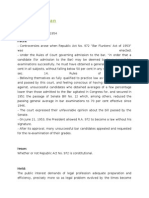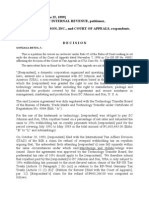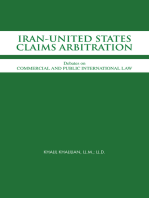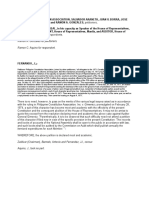0 ratings0% found this document useful (0 votes)
48 viewsWHEREFORE, We PARTLY GRANT The Petition and Rule That The
WHEREFORE, We PARTLY GRANT The Petition and Rule That The
Uploaded by
abakada_kayeThis case concerns a challenge to the sale of shares of Philippine Long Distance Telephone Company (PLDT) to First Pacific, a Hong Kong-based firm. The petitioner argues this sale violates the Philippine constitution's limit of foreign ownership in public utilities to no more than 40% of capital. The Supreme Court must determine if "capital" in the constitution refers only to common voting shares or total outstanding stock, which could impact allowed levels of foreign investment. While normally lacking jurisdiction over declaratory relief, the Court treats the petition as one for mandamus given the issue's national economic implications. The Court ultimately rules "capital" refers only to common voting shares, not total stock including non-voting preferred shares.
Copyright:
© All Rights Reserved
Available Formats
Download as DOC, PDF, TXT or read online from Scribd
WHEREFORE, We PARTLY GRANT The Petition and Rule That The
WHEREFORE, We PARTLY GRANT The Petition and Rule That The
Uploaded by
abakada_kaye0 ratings0% found this document useful (0 votes)
48 views1 pageThis case concerns a challenge to the sale of shares of Philippine Long Distance Telephone Company (PLDT) to First Pacific, a Hong Kong-based firm. The petitioner argues this sale violates the Philippine constitution's limit of foreign ownership in public utilities to no more than 40% of capital. The Supreme Court must determine if "capital" in the constitution refers only to common voting shares or total outstanding stock, which could impact allowed levels of foreign investment. While normally lacking jurisdiction over declaratory relief, the Court treats the petition as one for mandamus given the issue's national economic implications. The Court ultimately rules "capital" refers only to common voting shares, not total stock including non-voting preferred shares.
Original Description:
gamboa
Original Title
Gamboa v Teves
Copyright
© © All Rights Reserved
Available Formats
DOC, PDF, TXT or read online from Scribd
Share this document
Did you find this document useful?
Is this content inappropriate?
This case concerns a challenge to the sale of shares of Philippine Long Distance Telephone Company (PLDT) to First Pacific, a Hong Kong-based firm. The petitioner argues this sale violates the Philippine constitution's limit of foreign ownership in public utilities to no more than 40% of capital. The Supreme Court must determine if "capital" in the constitution refers only to common voting shares or total outstanding stock, which could impact allowed levels of foreign investment. While normally lacking jurisdiction over declaratory relief, the Court treats the petition as one for mandamus given the issue's national economic implications. The Court ultimately rules "capital" refers only to common voting shares, not total stock including non-voting preferred shares.
Copyright:
© All Rights Reserved
Available Formats
Download as DOC, PDF, TXT or read online from Scribd
Download as doc, pdf, or txt
0 ratings0% found this document useful (0 votes)
48 views1 pageWHEREFORE, We PARTLY GRANT The Petition and Rule That The
WHEREFORE, We PARTLY GRANT The Petition and Rule That The
Uploaded by
abakada_kayeThis case concerns a challenge to the sale of shares of Philippine Long Distance Telephone Company (PLDT) to First Pacific, a Hong Kong-based firm. The petitioner argues this sale violates the Philippine constitution's limit of foreign ownership in public utilities to no more than 40% of capital. The Supreme Court must determine if "capital" in the constitution refers only to common voting shares or total outstanding stock, which could impact allowed levels of foreign investment. While normally lacking jurisdiction over declaratory relief, the Court treats the petition as one for mandamus given the issue's national economic implications. The Court ultimately rules "capital" refers only to common voting shares, not total stock including non-voting preferred shares.
Copyright:
© All Rights Reserved
Available Formats
Download as DOC, PDF, TXT or read online from Scribd
Download as doc, pdf, or txt
You are on page 1of 1
GAMBOA V TEVES (facts partly lifted from Allens digest
covering another topic)
acts: Act No. 3436 granted PLDT a franchise and the right to
engage in telecommunications business. General Telephone and
lectronics !orporation "GT#$ an American compan% and a ma&or
PLDT stoc'holder$ sold (6 percent of the outstanding common
shares of PLDT to PT)!. Prime *oldings$ )nc. "P*)# +as
incorporated b% se,eral persons$ P*) became the o+ner of ---$4-.
shares of stoc' of PT)! b% ,irtue of three Deeds of Assignment
e/ecuted b% PT)! stoc'holders. The ---$4-. shares of stoc' of
PT)! held b% P*) +ere se0uestered b% the P!GG. The ---$4-.
PT)! shares$ +hich represent about 46.-(. percent of the
outstanding capital stoc' of PT)!$ +ere later declared b% this !ourt
to be o+ned b% the 1epublic of the Philippines.
.4 percent of PT)! shares +ere sold to *ong 2ong3based firm 4irst
Pacific$ and the remaining 46 percent +as sold through public
bidding b% the )nter3Agenc% Pri,ati5ation !ouncil$ and e,entuall%
ended up being bought b% 4irst Pacific subsidiar% 6etro Pacific
Asset *oldings )nc."6PA*# after the corporation e/ercised its right of
first refusal. The transaction +as an indirect sale of -( million shares
or 6.3 percent of the outstanding common shares of PLDT$ ma'ing
4irst Pacific7s common shareholdings of PLDT to 38 percent and the
total common shareholdings of foreigners in PLDT to 9-.48 percent.
:apanese NTT Do!o6o o+ns .-..6 percent of the other foreign
shareholdings;e0uit%.
Petitioner Gamboa$ alleged that the sale of ---$4-. shares to
6PA* ,iolates <ec. -- of Art. =))of the !onstitution$ +hich limits
foreign o+nership of the capital of a public utilit% to not morethan 4>
percent.
Petitioner raises the follo+ing issues: "-# +hether the consummation
of the then impending sale of ---$4-. PT)! shares to 4irst Pacific
,iolates the constitutional limit on foreign o+nership of a public
utilit%? "(# +hether public respondents committed gra,e abuse of
discretion in allo+ing the sale of the ---$4-. PT)! shares to 4irst
Pacific? and "3# +hether the sale of common shares to foreigners in
e/cess of 4> percent of the entire subscribed common capital stoc'
,iolates the constitutional limit on foreign o+nership of a public
utilit%.
9
!ss"e: @hether or not the !ourt ma% properl% ta'e cogni5ance of
the petition for declarator% relief. AA B<.
#$%!&G:
This !ourt is not a trier of facts. 4actual 0uestions such as those
raised b% petitioner$
C
+hich indisputabl% demand a thorough
e/amination of the e,idence of the parties$ are generall% be%ond this
!ourt7s &urisdiction. Adhering to this +ell3settled principle$ the !ourt
shall confine the resolution of the instant contro,ers% solel% on
the threshold and p"rely legal iss"e of +hether the term DcapitalD
in <ection --$ Article =)) of the !onstitution refers to the total
common shares onl% or to the total outstanding capital stoc'
"combined total of common and non3,oting preferred shares# of
PLDT$ a public utilit%.
Petition for declaratory relief treated as petition for mandamus
At the outset$ petitioner is faced +ith a procedural barrier. Among the
remedies petitioner see's$ onl% the petition for prohibition is +ithin
the original &urisdiction of this court$ +hich ho+e,er is not e/clusi,e
but is concurrent +ith the 1egional Trial !ourt and the !ourt of
Appeals. The actions for declarator% relief$
->
in&unction$ and
annulment of sale are not embraced +ithin the original &urisdiction of
the <upreme !ourt. En this ground alone$ the petition could ha,e
been dismissed outright.
@hile direct resort to this !ourt ma% be &ustified in a petition for
prohibition$
--
the !ourt shall ne,ertheless refrain from discussing the
grounds in support of the petition for prohibition since on (9
4ebruar% (>>8$ the 0uestioned sale +as consummated +hen 6PA*
paid )P! P(.$(-8$..6$>>> and the go,ernment deli,ered the
certificates for the ---$4-. PT)! shares.
*o+e,er$ since the threshold and purel% legal issue on the definition
of the term DcapitalD in <ection --$ Article =)) of the !onstitution has
far3reaching implications to the national econom%$ the !ourt treats
the petition for declarator% relief as one for mandamus.
-(
)n short$ it is +ell3settled that this !ourt ma% treat a petition for
declarator% relief as one for mandamus if the issue in,ol,ed has far3
reaching implications. As this !ourt held in Salvacion:
The !ourt has no original and e/clusi,e &urisdiction o,er a petition
for declarator% relief. 'o(ever) e*ceptions to this r"le have +een
recogni,ed- Th"s) (here the petition has far.reaching
implications and raises /"estions that sho"ld +e resolved) it
may +e treated as one for mandam"s.
The instant petition therefore presents the !ourt +ith another
opportunit% to finall% settle this p"rely legal iss"e +hich is of
transcendental importance to the national econom% and a
fundamental re0uirement to a faithful adherence to our !onstitution.
The !ourt must forth+ith sei5e such opportunit%$ not onl% for the
benefit of the litigants$ but more significantl% for the benefit of the
entire 4ilipino people$ to ensure$ in the +ords of the !onstitution$ Da
self3reliant and independent national econom% effectively
controlled b% 4ilipinos.D
-9
Fesides$ in the light of ,ague and
confusing positions ta'en b% go,ernment agencies on this purel%
legal issue$ present and future foreign in,estors in this countr%
deser,e$ as a matter of basic fairness$ a categorical ruling from this
!ourt on the e/tent of their participation in the capital of public
utilities and other nationali5ed businesses.
Despite its far3reaching implications to the national econom%$ this
purel% legal issue has remained unresol,ed for o,er 8. %ears since
the -C3. !onstitution. There is no reason for this !ourt to e,ade this
e,er recurring fundamental issue and dela% again defining the term
Dcapital$D +hich appears not onl% in <ection --$ Article =)) of the
!onstitution$ but also in <ection ($ Article =)) on co3production and
&oint ,enture agreements for the de,elopment of our natural
resources$
-C
in <ection 8$ Article =)) on o+nership of pri,ate
lands$
(>
in <ection ->$ Article =)) on the reser,ation of certain
in,estments to 4ilipino citi5ens$
(-
in <ection 4"(#$ Article =)G on the
o+nership of educational institutions$
((
and in <ection --"(#$ Article
=G) on the o+nership of ad,ertising companies.
:ust so alam natin$ the ending is:
WHEREFORE, we PARTLY GRANT the petition and rule that the
term "capital" in Section 11, Article XII of the 1987 Constitution refers
onl to shares of stoc! entitled to vote in the election of directors,
and thus in the present case onl to common shares, and not to the
total outstandin" capital stoc! #common and non$votin" preferred
shares%& 'espondent Chairperson of the Securities and ()chan"e
Commission is DRE!TED to appl this definition of the term
"capital" in determinin" the e)tent of allowa*le forei"n ownership in
respondent +hilippine ,on" -istance .elephone Compan, and if
there is a violation of Section 11, Article XII of the Constitution, to
impose the appropriate sanctions under the law&
You might also like
- Con Law Attack SheetDocument24 pagesCon Law Attack Sheetlylid66100% (13)
- STOP ALL! Debt Collectors Calls and Debt Collections FDCPA Does NOT "Include" The "People" or 50 Union States of AmericaPublic NoticeDocument3 pagesSTOP ALL! Debt Collectors Calls and Debt Collections FDCPA Does NOT "Include" The "People" or 50 Union States of AmericaPublic Noticein1or83% (6)
- Litex Employee's Association v. EduvalaDocument4 pagesLitex Employee's Association v. EduvalaJohnBenetteTarrobagoNo ratings yet
- Habeas Corpus in The U S District Court GainsvilleDocument11 pagesHabeas Corpus in The U S District Court GainsvilleRoy Callahan100% (2)
- Equity & Trust Law BookDocument46 pagesEquity & Trust Law BookDennis Strong67% (3)
- ComplaintDocument44 pagesComplaintAnne Schindler100% (1)
- Petroleum Shipping Limited v. NLRC (2006)Document5 pagesPetroleum Shipping Limited v. NLRC (2006)Zan BillonesNo ratings yet
- COL CASES For MidtermsDocument11 pagesCOL CASES For MidtermsDeizzy Mei KomichoNo ratings yet
- La Bugal-B'Laan vs. Ramos, G.R. No. 127882, Dec. 1, 2004Document4 pagesLa Bugal-B'Laan vs. Ramos, G.R. No. 127882, Dec. 1, 2004Aiken Alagban Ladines100% (3)
- Randy's Civ Pro I OutlineDocument10 pagesRandy's Civ Pro I OutlineRandy MontgomeryNo ratings yet
- Cases On ElectionDocument3 pagesCases On ElectionDave A ValcarcelNo ratings yet
- Every Homeowner With Property or Has Lost Property To Foreclosure Hear This - Land PatentDocument10 pagesEvery Homeowner With Property or Has Lost Property To Foreclosure Hear This - Land Patentguyte123100% (2)
- Local Government Code (Full Cases)Document53 pagesLocal Government Code (Full Cases)Janine Prelle DacanayNo ratings yet
- Held: Such Early Warning DeviceDocument11 pagesHeld: Such Early Warning DeviceKGTorresNo ratings yet
- Torts: Conceptual FrameworkDocument22 pagesTorts: Conceptual FrameworkAicing Namingit-VelascoNo ratings yet
- Elaine PALEDocument95 pagesElaine PALEteddybearlawyerNo ratings yet
- I. Far-Reaching Implications of The Legal Issue Justify Treatment of Petition For Declaratory Relief As One For MandamusDocument33 pagesI. Far-Reaching Implications of The Legal Issue Justify Treatment of Petition For Declaratory Relief As One For MandamusGuillermo Olivo IIINo ratings yet
- Phil Rules of CourtDocument243 pagesPhil Rules of CourtferdzkyNo ratings yet
- Alliance of Government Workers v. Minister of Labor (1983)Document8 pagesAlliance of Government Workers v. Minister of Labor (1983)Zan BillonesNo ratings yet
- Santos III v. Northwest 210 Scra 256Document11 pagesSantos III v. Northwest 210 Scra 256Kurisuchan DamnitNo ratings yet
- Dentech Manufacturing Corp v. NLRC (1989)Document3 pagesDentech Manufacturing Corp v. NLRC (1989)Zan BillonesNo ratings yet
- Luts Vs AranetaDocument3 pagesLuts Vs Aranetajon_cpaNo ratings yet
- Presumptions in Aid of Construction and InterpretationDocument41 pagesPresumptions in Aid of Construction and InterpretationTricia Marie LanaqueNo ratings yet
- Insurance Die GestDocument10 pagesInsurance Die GestKenneth LandichoNo ratings yet
- Filinvest Land Vs CA - EdDocument2 pagesFilinvest Land Vs CA - Edida_chua8023No ratings yet
- National Liberty Alliance CLGJ Letter To District Court JudgesDocument20 pagesNational Liberty Alliance CLGJ Letter To District Court JudgesSLAVEFATHERNo ratings yet
- Bishop Pedro Dulay, Et Al v. Exec SecDocument7 pagesBishop Pedro Dulay, Et Al v. Exec SecRZ ZamoraNo ratings yet
- Accepted 4 Value ExplainedDocument59 pagesAccepted 4 Value ExplainedKelly Ellis100% (2)
- Injunction. - A Preliminary Injunction May Be Granted WhenDocument3 pagesInjunction. - A Preliminary Injunction May Be Granted WhenKim EscosiaNo ratings yet
- Complaint Trial TechniqueDocument8 pagesComplaint Trial TechniqueJenifer PaglinawanNo ratings yet
- Cir Vs SC Johnson (GR 127105 June 25 1999)Document11 pagesCir Vs SC Johnson (GR 127105 June 25 1999)Brian BaldwinNo ratings yet
- Bombshell - Rod Class Gets FOURTH Administrative Ruling Government Offices Are Vacant - All Government Officials Are Private Contractors Public Notice/Public RecordDocument4 pagesBombshell - Rod Class Gets FOURTH Administrative Ruling Government Offices Are Vacant - All Government Officials Are Private Contractors Public Notice/Public Recordin1or100% (5)
- Heirs of Late Ruben Reinoso vs. C.ADocument5 pagesHeirs of Late Ruben Reinoso vs. C.AGuillermo Olivo IIINo ratings yet
- Limjoco V Intestate Estate of FraganteDocument1 pageLimjoco V Intestate Estate of FraganteNicole KalingkingNo ratings yet
- Atlas Consolidated Mining and Development Corporation, Petitioner, Versus, Commissioner of Internal Revenue, RespondentDocument8 pagesAtlas Consolidated Mining and Development Corporation, Petitioner, Versus, Commissioner of Internal Revenue, RespondentMa-an SorianoNo ratings yet
- Labor Law Reviewer (University of The Philippines College of Law)Document426 pagesLabor Law Reviewer (University of The Philippines College of Law)Si ZərNo ratings yet
- Morata Vs GoDocument3 pagesMorata Vs Goai ningNo ratings yet
- 28 Wells Fargo FULLDocument5 pages28 Wells Fargo FULLQueenie Hadiyah Diampuan SaripNo ratings yet
- Judgement ByTeam DDocument17 pagesJudgement ByTeam DMadhur25No ratings yet
- Cabadonga NewRetirementLawDocument158 pagesCabadonga NewRetirementLawJohn Dexter B. AbiertasNo ratings yet
- Family Courts Act, 1984Document7 pagesFamily Courts Act, 1984Raja Sanmanbir SinghNo ratings yet
- Untitled 2Document63 pagesUntitled 2Michael SweetNo ratings yet
- 203 - G.R. No. 191404Document6 pages203 - G.R. No. 191404masterlazarusNo ratings yet
- Javellana Constitutional Law - Political Question - Validity of The 1973 Constitution - Restriction To Judicial PowerDocument28 pagesJavellana Constitutional Law - Political Question - Validity of The 1973 Constitution - Restriction To Judicial Powermhilet_chiNo ratings yet
- (Consti Law 2) 148 - Ichong Vs Hernandez (Supra)Document13 pages(Consti Law 2) 148 - Ichong Vs Hernandez (Supra)Charm Divina LascotaNo ratings yet
- BUS ORG Batch2DigestDocument12 pagesBUS ORG Batch2DigestJenifer PaglinawanNo ratings yet
- Letter RequestDocument15 pagesLetter RequestRochedale ColasiNo ratings yet
- Pdaf Case DigestDocument3 pagesPdaf Case DigestChriszel Ann I. Queñano0% (1)
- Leyson vs. Office of The OmbudsmanDocument4 pagesLeyson vs. Office of The Ombudsmanvanessa_3No ratings yet
- LAMP v. Secretarydhbr Case DigestDocument2 pagesLAMP v. Secretarydhbr Case DigestVhan YansonNo ratings yet
- Conflicts of Law Memory AidDocument10 pagesConflicts of Law Memory AidLeizza Ni Gui Dula100% (1)
- Gujarat High Court Judgment - Tata NanoDocument53 pagesGujarat High Court Judgment - Tata NanokartikeyatannaNo ratings yet
- 28d G.R. No. 132527. July 29, 2005 Coconut Oil Refiners Association, Inc Vs TorresDocument1 page28d G.R. No. 132527. July 29, 2005 Coconut Oil Refiners Association, Inc Vs Torresrodolfoverdidajr100% (1)
- Maternity Children's Hospital vs. Secretary of Labor FactsDocument8 pagesMaternity Children's Hospital vs. Secretary of Labor FactsJaja Ordinario Quiachon-AbarcaNo ratings yet
- Ross, Lawrence, Selph and Carrascoso For Appellant. Office of The Solicitor-General Tuason For AppelleeDocument18 pagesRoss, Lawrence, Selph and Carrascoso For Appellant. Office of The Solicitor-General Tuason For AppelleeAl AaNo ratings yet
- Mmda Vs GarinDocument4 pagesMmda Vs GarinAiyu MallariNo ratings yet
- Iran-United States Claims Arbitration: Debates on Commercial and Public International LawFrom EverandIran-United States Claims Arbitration: Debates on Commercial and Public International LawNo ratings yet
- The Economic Policies of Alexander Hamilton: Works & Speeches of the Founder of American Financial SystemFrom EverandThe Economic Policies of Alexander Hamilton: Works & Speeches of the Founder of American Financial SystemNo ratings yet
- The Illegal Causes and Legal Cure of Poverty: Lysander SpoonerFrom EverandThe Illegal Causes and Legal Cure of Poverty: Lysander SpoonerNo ratings yet
- A New Banking System: The Needful Capital for Rebuilding the Burnt DistrictFrom EverandA New Banking System: The Needful Capital for Rebuilding the Burnt DistrictNo ratings yet
- Region (423H) Account Disclosed Abnormal or DebitDocument1 pageRegion (423H) Account Disclosed Abnormal or Debitabakada_kayeNo ratings yet
- Rufino SonsDocument1 pageRufino Sonsabakada_kayeNo ratings yet
- Malacat vs. Court of Appeals (GR 123595, 12 December 1997) FactsDocument1 pageMalacat vs. Court of Appeals (GR 123595, 12 December 1997) Factsabakada_kayeNo ratings yet
- Property No Description Est. Life Yrs RC Code Depreciable (1/0)Document2 pagesProperty No Description Est. Life Yrs RC Code Depreciable (1/0)abakada_kayeNo ratings yet
- Sings OnDocument2 pagesSings Onabakada_kayeNo ratings yet
- British American Tobacco V CamachoDocument1 pageBritish American Tobacco V Camachoabakada_kayeNo ratings yet
- Roxas V VasquezDocument1 pageRoxas V Vasquezabakada_kayeNo ratings yet
- Case 2Document1 pageCase 2abakada_kayeNo ratings yet
- Abakada Guro v. Ermita G.R. No. 168056, July 5, 2005 J. Puno en Banc FactsDocument1 pageAbakada Guro v. Ermita G.R. No. 168056, July 5, 2005 J. Puno en Banc Factsabakada_kayeNo ratings yet
- Whether The Sale Is Valid or Void For The Alleged Existence of Simulation of ContractDocument1 pageWhether The Sale Is Valid or Void For The Alleged Existence of Simulation of Contractabakada_kayeNo ratings yet
- Case 1Document1 pageCase 1abakada_kayeNo ratings yet
- Ra 9262Document8 pagesRa 9262abakada_kayeNo ratings yet
- Ra 8353Document2 pagesRa 8353abakada_kaye100% (1)
- Salvador V MapaDocument1 pageSalvador V Mapaabakada_kayeNo ratings yet
- Aguas V LlenosDocument1 pageAguas V Llenosabakada_kayeNo ratings yet
- Heirs of Gregoire V BakerDocument1 pageHeirs of Gregoire V Bakerabakada_kayeNo ratings yet
- Atty. Ubaldino A. Lacurom, - Versus - Judge Juanita C. Tienzo, Regional Trial Court, Branch 27, CabanatuancityDocument1 pageAtty. Ubaldino A. Lacurom, - Versus - Judge Juanita C. Tienzo, Regional Trial Court, Branch 27, Cabanatuancityabakada_kayeNo ratings yet
- DELA PENA V CaDocument1 pageDELA PENA V Caabakada_kayeNo ratings yet
- Commissioner vs. Phoenix AssuranceDocument1 pageCommissioner vs. Phoenix Assuranceabakada_kayeNo ratings yet
- Cobsti DigestDocument7 pagesCobsti Digestabakada_kayeNo ratings yet
- Jarantilla Vs CADocument7 pagesJarantilla Vs CARachelle DomingoNo ratings yet
- Tuzon v. Court of AppealsDocument7 pagesTuzon v. Court of Appealslovekimsohyun89No ratings yet
- Philconsa V VillarealDocument1 pagePhilconsa V VillarealRogie ToriagaNo ratings yet
- Documentary and Factual Verification in Writ Jurisdiction of High Court 2008 SCDocument26 pagesDocumentary and Factual Verification in Writ Jurisdiction of High Court 2008 SCSridhara babu. N - ಶ್ರೀಧರ ಬಾಬು. ಎನ್No ratings yet
- Petition To Remove Judge Peter Brigham 5D23-0814Document44 pagesPetition To Remove Judge Peter Brigham 5D23-0814Neil GillespieNo ratings yet
- CenPEG Vs ComelecDocument2 pagesCenPEG Vs ComelecJames CullaNo ratings yet
- Consti 2-Police PowerDocument5 pagesConsti 2-Police PowerJay Sta MariaNo ratings yet
- Sharp International MarketingDocument5 pagesSharp International MarketingBourgeoisified LloydNo ratings yet
- Consti Prelims DigestedDocument69 pagesConsti Prelims DigestedMicah Clark-MalinaoNo ratings yet
- Mercado Vs UbayDocument2 pagesMercado Vs Ubayanna pineda0% (1)
- Parayno vs. JovellanosDocument5 pagesParayno vs. JovellanosShayrie WynneNo ratings yet
- Rayos Vs City of Manila GR No 196063Document25 pagesRayos Vs City of Manila GR No 196063Ivan Montealegre ConchasNo ratings yet
- COMELEC Digests ZoeDocument10 pagesCOMELEC Digests ZoeZoe VelascoNo ratings yet
- SCA TSN Rules 62-66Document16 pagesSCA TSN Rules 62-66luidkinniNo ratings yet
- Lihaylihay v. Treasurer of The Philippines DigestDocument6 pagesLihaylihay v. Treasurer of The Philippines DigestcinfloNo ratings yet
- Rule 136 ADocument333 pagesRule 136 AJamieNo ratings yet
- Wilson Vs ErmitaDocument7 pagesWilson Vs Ermitaoabeljeanmonique0% (1)
- Nevada Reports 1870-1871 (6 Nev.) PDFDocument313 pagesNevada Reports 1870-1871 (6 Nev.) PDFthadzigsNo ratings yet
- Annotation BailDocument48 pagesAnnotation BailPia Christine BungubungNo ratings yet
- Dministrative Law and Judicial Review of Administrative ActionDocument11 pagesDministrative Law and Judicial Review of Administrative ActionAditya GuptaNo ratings yet
- Ca 460 2021 PDFDocument12 pagesCa 460 2021 PDFSandamal RajapakseNo ratings yet
- DownloadedDocument16 pagesDownloadedK RamakrishnanNo ratings yet
- Road Transport and Safety Agency V First National Bank Zambia LTD and Anor (Appeal 127 of 2016) 2019 ZMSC 311 (28 May 2019)Document27 pagesRoad Transport and Safety Agency V First National Bank Zambia LTD and Anor (Appeal 127 of 2016) 2019 ZMSC 311 (28 May 2019)AbrahamNo ratings yet
- Sindhu Education Society Vs The Municipal Corporam010143COM892216Document6 pagesSindhu Education Society Vs The Municipal Corporam010143COM892216HarshalbelekarNo ratings yet
- Curative Petition Case Rupa Ashok HurraDocument18 pagesCurative Petition Case Rupa Ashok HurraKaran SinghNo ratings yet
- Kabataan Party Asst. Representative Raymond Palatino vs. COMELECDocument4 pagesKabataan Party Asst. Representative Raymond Palatino vs. COMELECIsabeau Jane Salvatore St-PierreNo ratings yet
- Talento Vs Escalada Jr.Document20 pagesTalento Vs Escalada Jr.Terry FordNo ratings yet
- Remrev FinalDocument272 pagesRemrev FinalNympa VillanuevaNo ratings yet
- Answer 1Document4 pagesAnswer 1Juwel KobirNo ratings yet













































































































